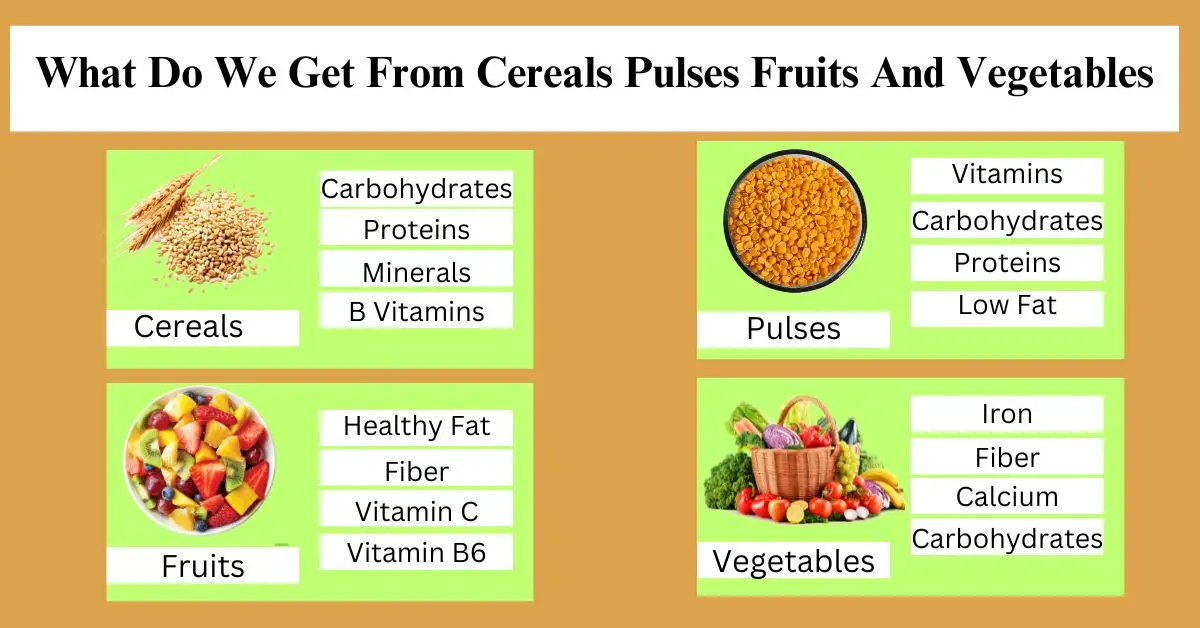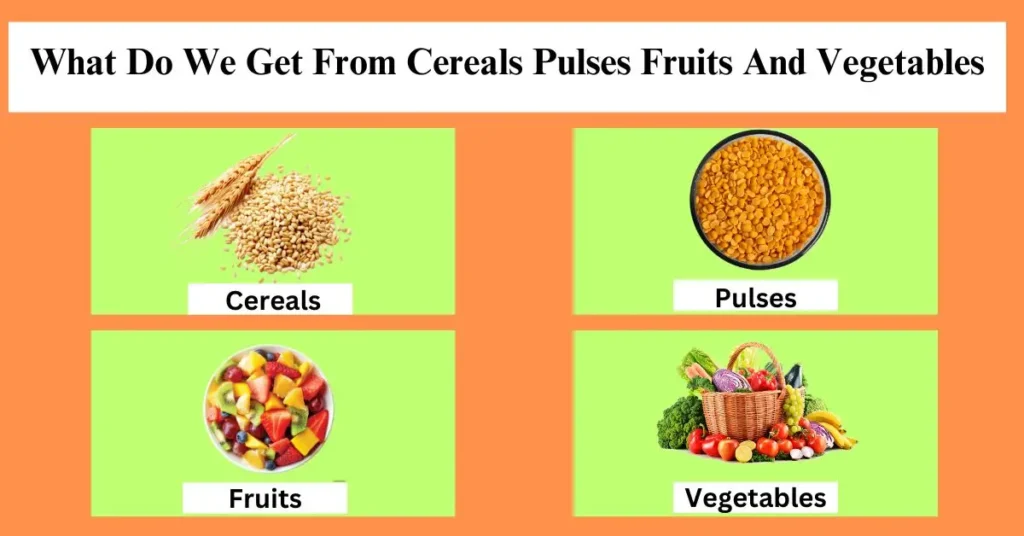In the world of healthy eating, cereals, pulses, fruits, and vegetables are very important for us. In this article we will learn what do we get from cereals pulses fruits and vegetables. We’ll explore the goodness that cereals, pulses, fruits, and vegetables offer.

Cereals gives carbohydrates, proteins and nutrients, pulses provide plant-based protein and fiber, and fruits and vegetables supply vitamins, minerals, and antioxidants essential for overall health.
These foods give us the energy and nutrients we need to stay healthy and strong. They bring a rich diversity of nutrients to our plates, each with its unique benefits.
Cereals
Examples of cereals are wheat, rice, corn, oats, barley, rye, and millet, among others. Some of the essential nutrients we get from cereals are –
Carbohydrates – Cereals are a great source of carbohydrates. They contain about 70-80% of Carbohydrates, which are the primary source of energy for our bodies. Carbohydrates are broken down into glucose, which gives energy to our brain and muscles.
Protein – There is around 7% to 17% of protein in different cereals. Protein is necessary for the development and repair of tissues as well as supporting different functions in the body.
Dietary Fiber – Cereals are a good source of dietary fiber, there is around 2-12% of dietary fibers in cereals. It is essential for healthy digestion. Fiber maintains a healthy gut and helps in regulating bowel movements. It also helps prevent constipation.
Minerals – Cereals provide essential minerals like iron, magnesium, and zinc. They are necessary for oxygen transport in the blood, muscle and nerve function, and helps with immune system function and wound healing.
B-vitamins – They are a good source of B-vitamins such as thiamin, riboflavin, niacin, and folate. These vitamins play important roles in converting food into energy, supporting nervous system function, and help in cell growth and repair.
Antioxidants – Cereals such as oats and whole grains, contain antioxidants that help protect our cells from damage caused by free radicals.
Pulses
Pulses are also known as legumes. Examples of pulses are lentils, peas chickpeas, grams such as urad dal, moong dal, green gram and soyabeans. Different nutrients we get from pulses are –
Protein – Pulses have about 20-30% of protein in them. They have a higher amount of protein than cereals. Protein contains essential amino acids that our bodies need for building and repairing tissues, supporting muscle function, and various other body processes.
Carbohydrates – Pulses have about 50-65% of carbohydrates. Cooked chickpeas have around 60% carbohydrates. They help in steady release of energy over time and help to stabilize blood sugar levels.
Low in Fat – Pulses are generally low in fat, making them a heart-healthy food choice.
Low Glycemic Index – Pulses have a low glycemic index, meaning they have a slower impact on blood sugar levels, making them suitable for people with diabetes.
Vitamins – Pulses contain various vitamins, such as folate (vitamin B9), thiamin (vitamin B1), and niacin (vitamin B3). These vitamins are essential for metabolism, energy production, and overall well-being.
Cholesterol-lowering Properties – Regular consumption of pulses has been associated with reducing LDL (bad) cholesterol levels, promoting heart health.
Pulses also contain minerals, dietary fibers and antioxidants.
Fruits
Fruits are packed with a wide range of essential nutrients and health benefits. Here are some of the things we get from fruits –
Citrus Fruits such as Oranges, Grapefruits, Tangerines, Lemons, and Limes contain Vitamin C, Fiber, Potassium, and antioxidants which boosts the immune system, supports collagen production, and helps with wound healing.
Berries such as Strawberries, Blueberries, Raspberries, and Blackberries have antioxidants (such as anthocyanins), Vitamin C, Fiber which improve digestive health and help in weight management.
Bananas and Papayas have nutrients like potassium, Vitamin B6, Vitamin C which supports heart health, helps regulate blood pressure, and in metabolism and nervous system function.
Fruits like Apples, Pears, Kiwi, Mangoes and Pineapples contain dietary Fiber, vitamin C, and carbohydrates which boosts the immune system, promotes gut health, and supports vision and skin health.
Avocado is an excellent source of healthy fats and fiber which improves digestion and promotes a feeling of fullness.
Other fruits like Pomegranates and Grapes are rich in antioxidants that help protect cells from oxidative damage and are good for the heart.
Vegetables
Vegetables are an excellent source of many nutrients which give us lots of nutrition and provide various health benefits.
Leafy Greens vegetables like Spinach, Kale, and Lettuce contain Vitamin K, Vitamin A (beta-carotene), Folate, Iron, Calcium, and Fiber which are beneficial for eyes, reduce cholesterol levels, and stabilize blood sugar levels.
Broccoli and Cauliflower are rich in protein which maintain healthy bones, and healthy gut, etc.
Sweet Potatoes, Beets, Radishes, and Turnips are rich in Vitamin A (beta-carotene), Potassium, and Fiber. They provide energy, support immune function, and improve blood flow.
Potatoes, Corn, and Peas are a rich source of carbohydrates providing sustained energy and improving immune system.
Carrots are rich in beta-carotene, carrots support vision health, boost the immune system, and promote healthy skin.
Cucumbers with high water content and silica, help in hydration, support skin health, and contribute to healthy hair and nails.
Tomatoes and Eggplants contain Vitamin C, Vitamin A, Potassium, and antioxidant properties, which support heart health and brain function.
- All these vegetables also provide us with Roughage which is an essential part of our daily nourishment.
As we have seen, what do we get from cereals, pulses, fruits, and vegetables are different and huge varieties of nutrients, minerals and vitamins. However, alongside cereals, pulses, fruits, and vegetables, sources of protein like meat, poultry, fish, and dairy products are also necessary.
Dairy products, such as milk, yogurt, and cheese, supply calcium and Vitamin D for strong bones and teeth and are necessary nutrients to support various body functions, immunity, and overall well-being.
Conclusion
In conclusion, the answer to what do we get from cereals pulses fruits and vegetables is a wealth of essential nutrients, including carbohydrates, proteins, vitamins, minerals, and fiber. Incorporating these food groups into our diet supports overall health, promotes proper digestion, boosts the immune system, and reduces the risk of chronic diseases. A balanced diet that includes a variety of these nutritious foods is crucial for maintaining optimal well-being.
Also Read





